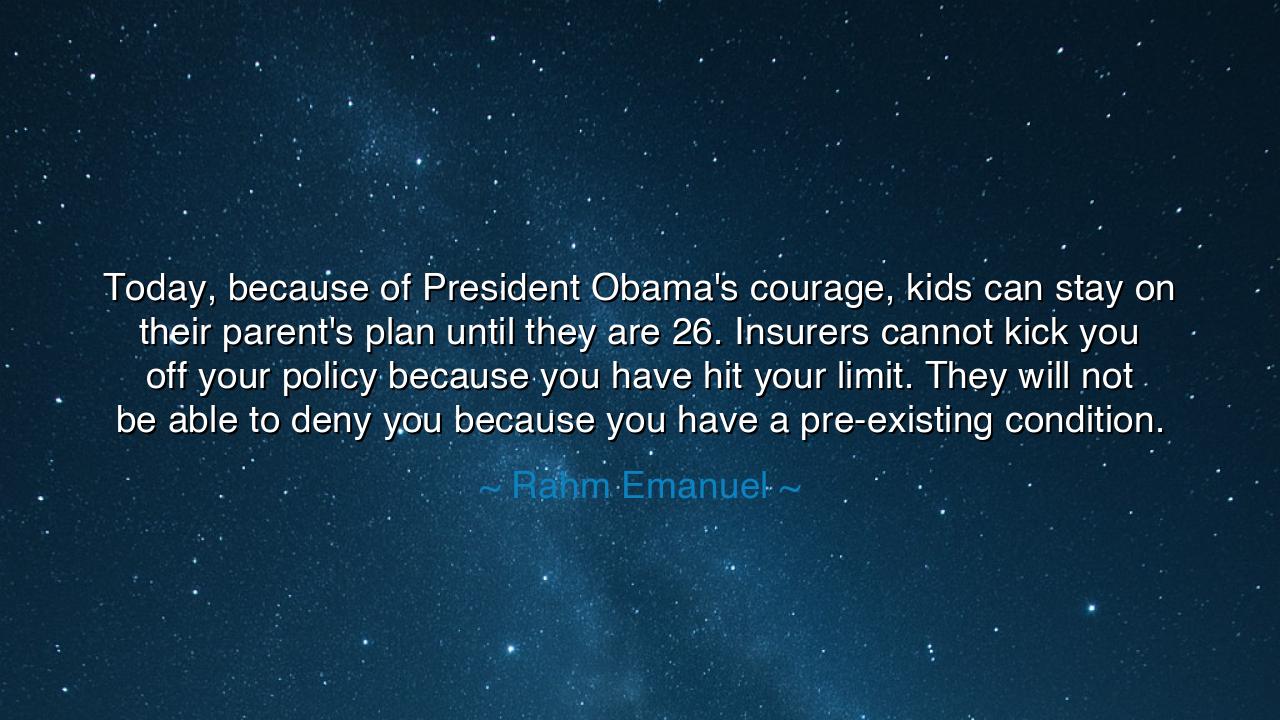
Today, because of President Obama's courage, kids can stay on
Today, because of President Obama's courage, kids can stay on their parent's plan until they are 26. Insurers cannot kick you off your policy because you have hit your limit. They will not be able to deny you because you have a pre-existing condition.






In the voice of reverence and conviction, Rahm Emanuel proclaimed words that echo with both gratitude and remembrance: “Today, because of President Obama’s courage, kids can stay on their parent’s plan until they are 26. Insurers cannot kick you off your policy because you have hit your limit. They will not be able to deny you because you have a pre-existing condition.” These are not mere statements of policy—they are the markings of moral triumph, born from struggle and sacrifice. In this declaration, Emanuel honors a moment in history when courage, not convenience, guided leadership; when compassion overcame fear; when the voice of justice spoke louder than the clamor of opposition.
The origin of these words lies in the passage of the Affordable Care Act (ACA), a law that redefined the landscape of healthcare in the United States. It was not won easily. The battle for it was long, bitter, and fraught with misunderstanding. Yet through the turbulence stood President Barack Obama, steadfast in his conviction that access to care is not a privilege for the fortunate, but a right for every human being. In this, he joined the lineage of leaders who, like warriors of conscience, fought not for power but for mercy. Emanuel, who had stood by him as Chief of Staff, bore witness to this struggle—the sleepless nights, the unyielding attacks, the doubts that shadowed even the strong. When he speaks of Obama’s courage, it is not the praise of rhetoric—it is the testimony of one who saw courage in its raw, enduring form.
For what is courage, if not the will to do what is right when the world demands retreat? It is easy to govern when the winds are calm and the crowd applauds. But true courage shines in resistance—in the moment when a leader, facing the fury of opposition, stands firm because conscience commands it. Obama’s defense of healthcare reform was such a moment. He was told it would destroy his presidency; that the political cost was too great. Yet he chose to act. He chose to lift millions out of fear—the fear of illness, of bankruptcy, of being forsaken by the system meant to protect them. In doing so, he proved that the measure of leadership is not in approval ratings, but in compassion enacted through principle.
Emanuel’s words recall the ancient truth that the greatness of any society is revealed not in how it rewards the strong, but in how it protects the weak. In the spirit of the ancients, one might compare this to the story of Pericles, who built Athens not only upon marble and stone but upon ideals—justice, equity, and public welfare. Just as Pericles envisioned a city that served all its citizens, so too did Obama envision a nation where the sick are not abandoned, where the young are not thrust into despair, and where the poor are not punished for their poverty. Such visions are the work of statesmen who remember that they serve not the powerful, but the people.
In Emanuel’s recitation of these reforms—children remaining insured, no limits, no denial for pre-existing conditions—we see more than policy; we see protection. Each clause is a shield, forged in the fires of empathy. To the child with chronic illness, it is hope. To the parent burdened by impossible costs, it is deliverance. To the elderly and vulnerable, it is dignity. These are not abstract victories—they are the quiet revolutions that ripple through generations. For when the heart of governance beats with compassion, it transforms politics into service, and legislation into love.
And yet, such victories remind us that progress is never permanent unless it is guarded by conscience. Just as the ancients warned that freedom requires vigilance, so too must justice be defended. Emanuel’s words, though spoken in triumph, are also a charge to those who follow: that each generation must choose whether to lead with fear or with courage. The laws of mercy, once written, can be erased; the protections of the weak can be undone if the fire of empathy grows cold. Thus, his words carry a timeless warning—to never take for granted what courage has won.
Let this then be the lesson passed down: honor those who lead with courage and character, for their deeds build the foundations upon which others stand. In your own life, let principle, not popularity, be your guide. Stand for what uplifts others, even when the cost is high. Be as the leaders of conscience who walk the hard road for the sake of the many.
For as Rahm Emanuel reminds us, the courage of one man—or woman—can change the fate of millions. When you choose integrity over ease, service over self, and compassion over indifference, you too become part of that noble lineage. The world may not always understand your choice, but history will. And in the quiet reckoning of the soul, you will know—as Obama knew—that to do the right thing, though not the easy thing, is to stand among the truly great.






AAdministratorAdministrator
Welcome, honored guests. Please leave a comment, we will respond soon